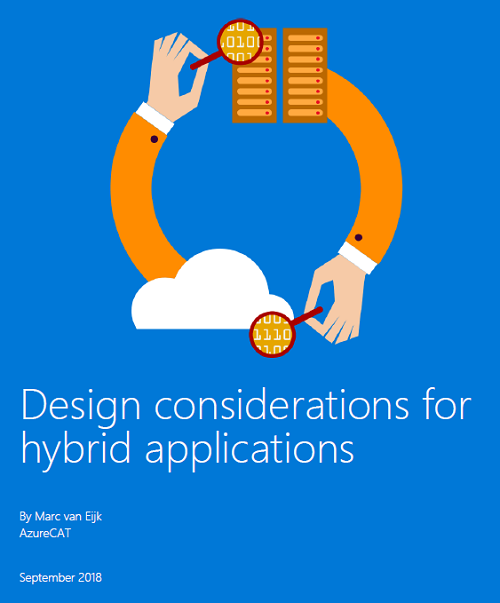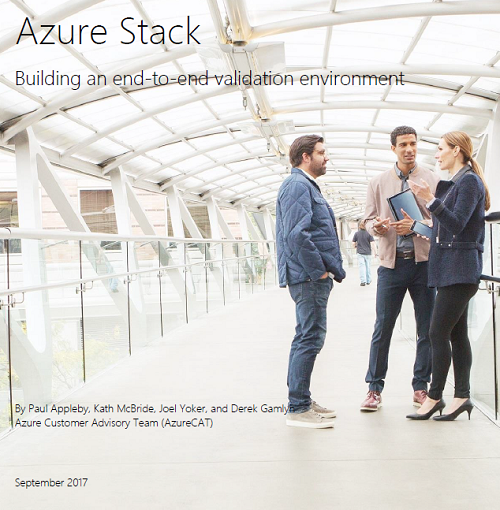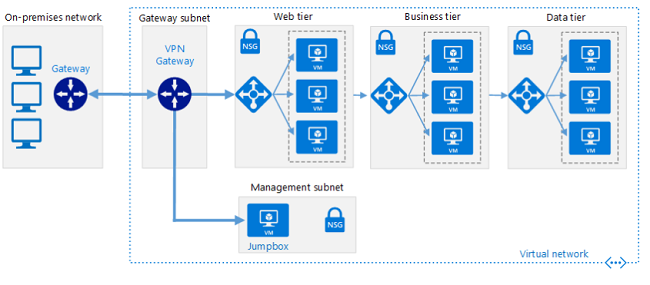Hybrid Cloud Architecture on Azure - Portal
UPDATED: 12/09/18
As cloud migration continues to evolve, hybrid architectures that enable companies to take advantage of both on-premises and cloud resources are a valuable tool. Hybrid architectures allow for a staged migration where cloud-based cost savings and efficiency are immediately realized for apps and data that are ready to move now, while essential mainframe resources can be moved later. The Hybrid Cloud Architecture on Azure – Portal provides links to all our content on the topic. New content is added as it becomes available.
 Design considerations for hybrid applications
Design considerations for hybrid applications
This whitepaper, by Marc van Eijk of the AzureCAT team, explores how Azure and its components can help you reuse your development investment to build hybrid applications. It provides key guidelines and best practices to follow in the design phase to optimize hybrid apps and avoid costly issues in the production environment. Download the whitepaper.
 Azure Stack: Building an end-to-end validation environment
Azure Stack: Building an end-to-end validation environment
This e-book, written by Paul Appleby, Kath McBride, Joel Yoker, and Derek Gamlyn of the AzureCAT team, provides the information you need to plan an end-to-end Azure Stack validation environment using the Azure Stack Development Kit. It covers the core concepts required to build a functional Azure Stack environment, including quotas, plans, and offers, subscriptions, and services. Learn about the constructs and configurable options available in Azure Stack, along with how to tackle the key considerations that go into planning a successful implementation. Download the e-book.
See these conceptual whitepapers to learn more about Azure Stack:
Hybrid Networking Reference Architectures
From AzureCAT members, Telmo Sampaio, Christopher Bennage, and Mike Wasson, this article compares options for connecting an on-premises network to an Azure Virtual Network. It explores the benefits and challenges of each connection option and provides a detailed reference architecture. Options covered include:
- Connect an on-premises network to Azure using a VPN gateway
- Connect an on-premises network to Azure using ExpressRoute
- Connect an on-premises network to Azure using ExpressRoute with VPN failover
- Implement a hub-spoke network topology in Azure
- Implement a hub-spoke network topology with shared services in Azure
Our Related Portals
See Also
- Microsoft Hybrid Cloud for Enterprise Architects
- Tutorial: Create cross-cloud scaling solutions with Azure
- Tutorial: Create a geo-distributed app solution with Azure and Azure Stack
- Tutorial: Deploy a hybrid cloud solution with Azure and Azure Stack
Azure CAT Guidance
"Hands-on solutions, with our heads in the Cloud!"
Comments
- Anonymous
November 27, 2018
Hi Ed, What is your recommendation in the implementation with Gateway VPN and multiple environments in Azure?Many times the discussion is generated. 1 VNET and GW for all environments (low cost); a VNET and GW for each environment (isolated), a VNET for each environment joined with pearings and 1 GW (Mixed)? Can you write about this? Thanks- Anonymous
November 29, 2018
Those are solid recommendations. Our Hybrid Networks Reference Architectures walk through several different scenarios for the number of VNETs: https://docs.microsoft.com/en-us/azure/architecture/reference-architectures/hybrid-networking/What would you be looking for in a comparison guide? Just more of an explanation as to why? Thanks, C Rovira!- Anonymous
November 30, 2018
The comment has been removed- Anonymous
November 30, 2018
No, I think you're right that this doesn't exist. I'll look into it. Thank you!
- Anonymous
- Anonymous
- Anonymous
- Anonymous
November 29, 2018
UPDATE: I added the "See Also" links. We've got some great tutorials based on some architectural patterns we're seeing.- Anonymous
December 10, 2018
I added another See Also link yesterday: Microsoft Hybrid Cloud for Enterprise Architects
- Anonymous
